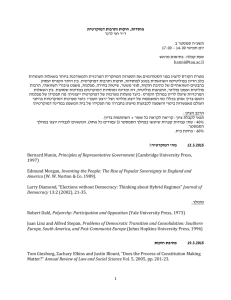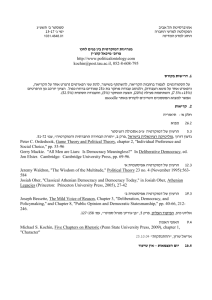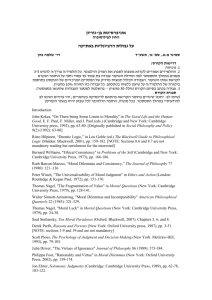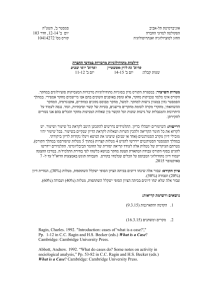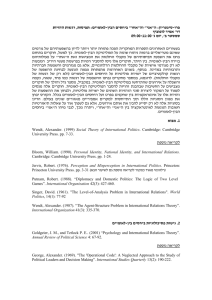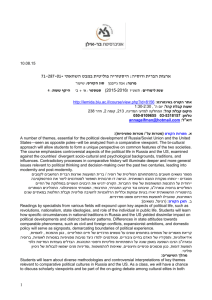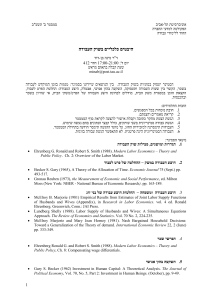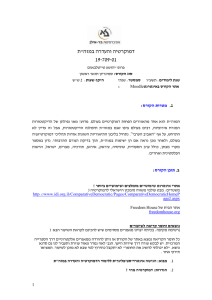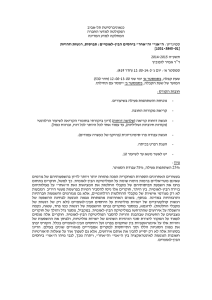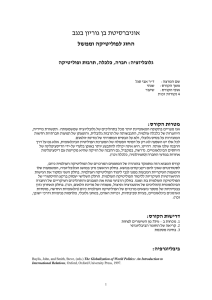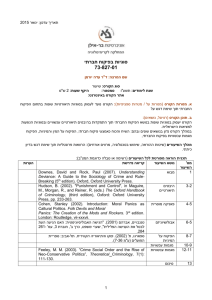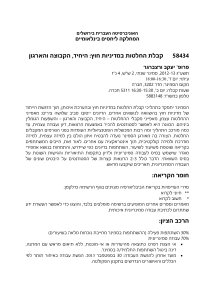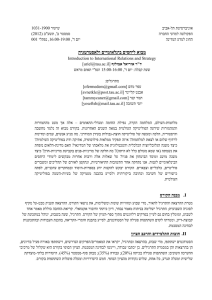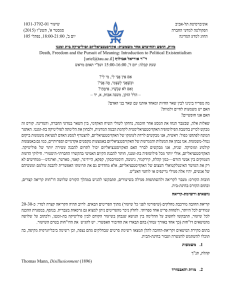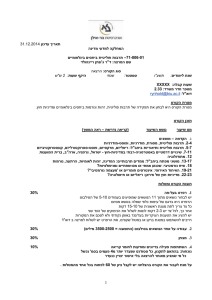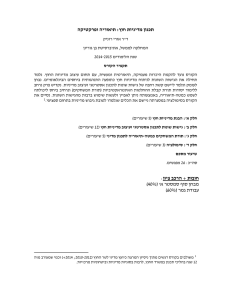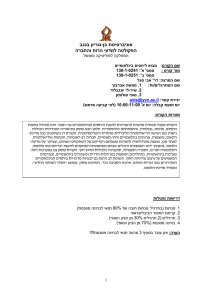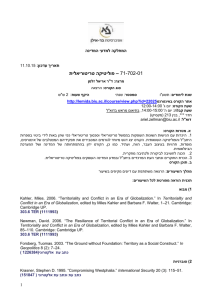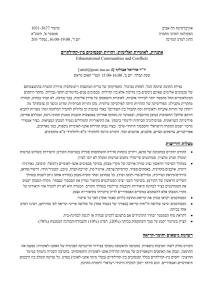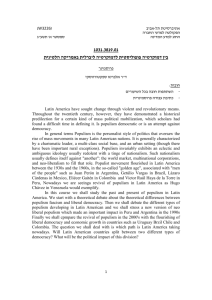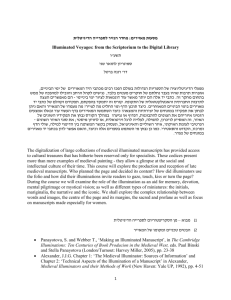לצפייה בסילבוס נא ללחוץ כאן
advertisement
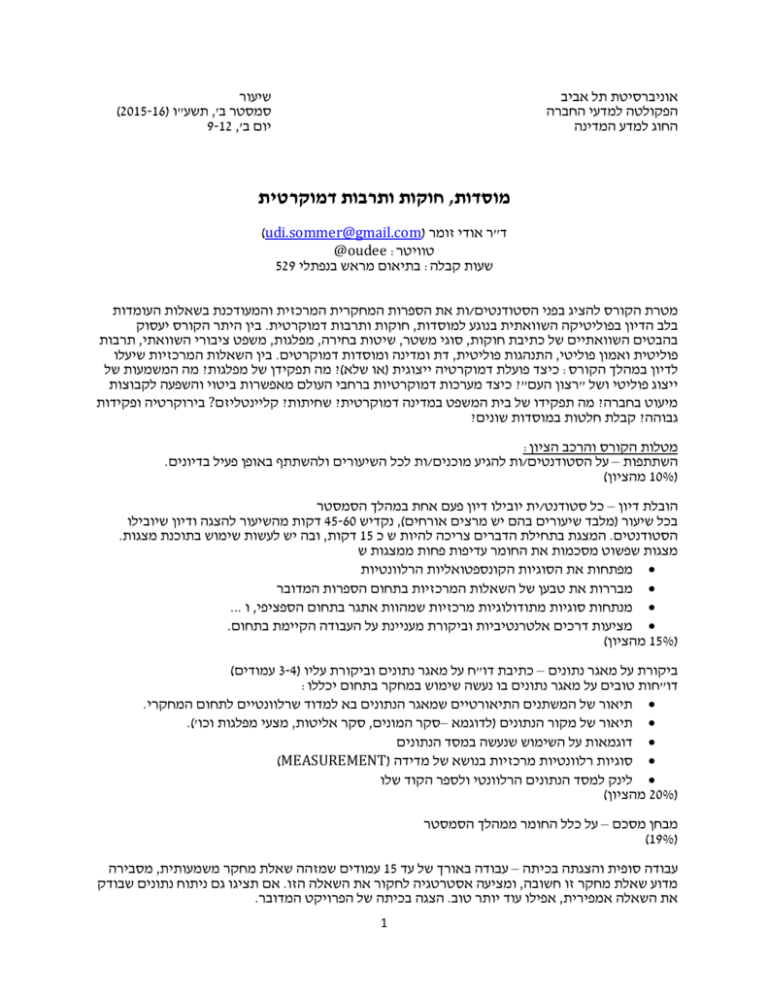
שיעור סמסטר ב' ,תשע"ו ()2015-16 יום ב'9-12 , אוניברסיטת תל אביב הפקולטה למדעי החברה החוג למדע המדינה מוסדות ,חוקות ותרבות דמוקרטית ד"ר אודי זומר ()udi.sommer@gmail.com טוויטר@oudee : שעות קבלה :בתיאום מראש בנפתלי 529 מטרת הקורס להציג בפני הסטודנטים/ות את הספרות המחקרית המרכזית והמעודכנת בשאלות העומדות בלב הדיון בפוליטיקה השוואתית בנוגע למוסדות ,חוקות ותרבות דמוקרטית .בין היתר הקורס יעסוק בהבטים השוואתיים של כתיבת חוקות ,סוגי משטר ,שיטות בחירה ,מפלגות ,משפט ציבורי השוואתי ,תרבות פוליטית ואמון פוליטי ,התנהגות פוליטית ,דת ומדינה ומוסדות דמוקרטים .בין השאלות המרכזיות שיעלו לדיון במהלך הקורס :כיצד פועלת דמוקרטיה ייצוגית (או שלא)? מה תפקידן של מפלגות? מה המשמעות של ייצוג פוליטי ושל "רצון העם"? כיצד מערכות דמוקרטיות ברחבי העולם מאפשרות ביטוי והשפעה לקבוצות מיעוט בחברה? מה תפקידו של בית המשפט במדינה דמוקרטית? שחיתות? קליינטליזם? בירוקרטיה ופקידות גבוהה? קבלת חלטות במוסדות שונים? מטלות הקורס והרכב הציון: השתתפות – על הסטודנטים/ות להגיע מוכנים/ות לכל השיעורים ולהשתתף באופן פעיל בדיונים. ( 10%מהציון) הובלת דיון – כל סטודנט/ית יובילו דיון פעם אחת במהלך הסמסטר בכל שיעור (מלבד שיעורים בהם יש מרצים אורחים) ,נקדיש 45-60דקות מהשיעור להצגה ודיון שיובילו הסטודנטים .המצגת בתחילת הדברים צריכה להיות ש כ 15דקות ,ובה יש לעשות שימוש בתוכנת מצגות. מצגות שפשוט מסכמות את החומר עדיפות פחות ממצגות ש מפתחות את הסוגיות הקונספטואליות הרלוונטיות מבררות את טבען של השאלות המרכזיות בתחום הספרות המדובר מנתחות סוגיות מתודולוגיות מרכזיות שמהוות אתגר בתחום הספציפי ,ו ... מציעות דרכים אלטרנטיביות וביקורת מעניינת על העבודה הקיימת בתחום. ( 15%מהציון) ביקורת על מאגר נתונים – כתיבת דו"ח על מאגר נתונים וביקורת עליו ( 3-4עמודים) דו"חות טובים על מאגר נתונים בו נעשה שימוש במחקר בתחום יכללו: תיאור של המשתנים התיאורטיים שמאגר הנתונים בא למדוד שרלוונטיים לתחום המחקרי. תיאור של מקור הנתונים (לדוגמא –סקר המונים ,סקר אליטות ,מצעי מפלגות וכו'). דוגמאות על השימוש שנעשה במסד הנתונים סוגיות רלוונטיות מרכזיות בנושא של מדידה ()MEASUREMENT לינק למסד הנתונים הרלוונטי ולספר הקוד שלו ( 20%מהציון) מבחן מסכם – על כלל החומר ממהלך הסמסטר ()19% עבודה סופית והצגתה בכיתה – עבודה באורך של עד 15עמודים שמזהה שאלת מחקר משמעותית ,מסבירה מדוע שאלת מחקר זו חשובה ,ומציעה אסטרטגיה לחקור את השאלה הזו .אם תציגו גם ניתוח נתונים שבודק את השאלה אמפירית ,אפילו עוד יותר טוב .הצגה בכיתה של הפרויקט המדובר. 1 ) מהציון36%( הכרות ומטלות,סילבוס לפברואר29 ?מהי דמוקרטיה? ומה הקשר לחוקה למרץ7 Tom Ginsburg, Zachary Elkins and Justin Blount, “Does the Process of Constitution Making Matter?” Annual Review of Law and Social Science Vol. 5, 2005, pp. 201-23. Zachary Elkins, Tom Ginsburg, and James Melton, The Endurance of National Constitutions. (Cambridge University Press, 2009), Chapters 2+3. Hanna Lerner, Making Constitutions in Deeply Divided Societies (Cambridge University Press, 2011), chapter 1+2. Comparative Constitutions Project: http://comparativeconstitutionsproject.org/ Bernard Manin, Principles of Representative Government (Cambridge University Press, 1997) Edmund Morgan, Inventing the People: The Rise of Popular Sovereignty in England and America (W. W. Norton & Co. 1989). Larry Diamond, “Elections without Democracy: Thinking about Hybrid Regimes” Journal of Democracy 13:2 (2002), 21-35. :נושאים אפשריים להובלת דיון ) מגדיר חלקConstitutionalism( מה המשמעות של עיקרון שלטון הרוב במצבים בהם מצב חוקתי זכויות מיעוטים) ככאלה שאינם נתונים,כלכלי (לדוגמא-חברתי-מהסוגיות שעל סדר היום הפוליטי ?להכרעות רוב מה ההיגיון (היגיון דמוקרטי או אחר) בהתחייבות של אומה שלמה למערכת חוקתית שתגביל את דור האבות והאימהות המייסדים ולפחות לכאורה גם את כל הדורות שיבואו אחריהם? האם יש היגיון ?כלכלי? היגיון פוליטי? אחר :מומלץ Tom Ginsburg, Comparative Constitutional Design (Cambridge University Press, 2013). Denis J. Galligan and Mila Versteeg, eds., Social and Political Foundations of Constitutions (New York: Cambridge University Press, 2013). Claude Klein and Andras Sajo, “Constitution-Making: Process and Substance” in: Michel Rosenfeld and Andra Sajo, eds. Oxford Handbook of Comparative Constitutional Law (Oxford University Press 2012). Robert Dahl, Polyarchy: Participation and Opposition (Yale University Press, 1973) 2 Juan Linz and Alfred Stepan, Problems of Democratic Transition and Consolidation: Southern Europe, South America, and Post-Communist Europe (Johns Hopkins University Press, 1996) שיטות בחירות למרץ14 Nils-Christian Bormann & Matt Golder, “Democratic Electoral Systems around the world, 1946–2011, Electoral Studies 32 (2013), 60-69. Arend Lijphart, “The Political Consequences of Electoral Laws, 1945-85” The American Political Science Review, Vol. 84, No. 2 (Jun., 1990), pp. 481-496. Pipa Norris, Electoral Engineering: Voting Rules and Political Behavior (Cambridge University Press, 2004), chapter 2. Pippa Norris, “Choosing Electoral Systems: Proportional, Majoritarian and Mixed Systems”, International Political Science Review 18:3 (1997), 297-312. http://www.hks.harvard.edu/fs/pnorris/Articles/Articles%20published%20in%20journa ls_files/Choosing_Electoral_Systems_1997.pdf :מומלץ G. Bingham Powell, Elections as Instruments of Democracy: Majoritarian and Proportional Visions (Yale University Press 2000). ייצוג ואחריותיות,מפלגות למרץ21 Karen E. Ferree, G. Bingham Powell, and Ethan Scheiner, “Context, Electoral Rules, and Party Systems” Annual Review of Political Science 17 (2014) 421–39. Carol Mershom and Olga Shvetsova, Party System Change in Legislatures Worldwide: Moving Outside the Electoral Arena (Cambridge University Press, 2013), Ch. 1 or 2. Giovanni Sartori, "A Typology of Party Systems", in Peter, Mair (Ed.) The West European Party System , (Oxford: Oxford University Press, 1990) pp. 316-350. Maurice Duverger "The Two-Party System and the Multiparty System", in Peter, Mair (Ed.) The West European Party System (Oxford: Oxford University Press, 1990) pp. 285-295. :מומלץ Introduction.‖ Plus. ―Elections and Representation‖ by Manin, Bernard and Adam Przeworski and Susan Stokes in Democracy, Accountability and Representation, ed. by Adam Przeworski, Susan C. Stokes, Bernard Manin, NewYork: Cambridge University Press. C. Fearon, James. 1999. Electoral Accountability and the Control of Politicians‖ in Democracy, Accountability and Representation, ed. by Adam Przeworski, Susan C. Stokes, Bernard Manin, NewYork: Cambridge University Press. C. Susan Stokes. 3 Policy Switches‖ Stokes, Susan.1999. What Do Policy Switches Tell Us about Democracy? in Adam Przeworski, Susan Stokes and Bernard Manin, eds. Democracy, Accountability and Representation, New York: Cambridge University Press. C. Powell, Bingham and Guy Whitten. 1993. A Cross-National Analysis of Economic Voting: Taking Into Account the Political Context.‖ American Journal of Political Science. 37:391-414. J. Besley, Timothy. 2005. Political Selection.‖ Journal of Political Economy. J. Besley, Tim and Burgess, Robin. 2002. The Political Economy of Government Responsiveness: Theory and Evidence from India, Quarterly Journal of Economics. 117/4. http://www.mitpressjournals.org/doi/pdf/10.1162/00335530232093506 :נושאים אפשריים להובלת דיון ? מה קובע את ההחלטות בדמוקרטיות לגבי שיטות הבחירה הנהוגות בהן Boix, Carles. 1999. Setting the Rules of the Game: The Choice of Electoral Systems in Advanced Democracies, American Political Science Review 93:3: 609-624. Cusack, Thomas, Iversen Torben, and David Soskice. 2007. Economic Interests and the Origins of Electoral Systems. American Political Science Review 101 3 :373-391. Calvo, Ernesto. 2009. The competitive road to proportional representation: partisan biases and electoral regimes under increasing party competition. World Politics. 61:2, 254- 295. Kreuzer,Markus. American Political Science Review. 2010. Response by Cusack et al. APSR. 2010. Response by Boix. APSR. 2010. ? מה הם התנאים בהם שליטים אוטוקרטיים מחוייבים לאחריותיות Malesky, Edmund and Paul Schuler. 2011. The Single-Party Dictator’s Dilemma: Information in Elections without Opposition Scott Gehlbach and Phil Keefer. 2011. "Investment without Democracy: Ruling-Party Institutionalization and Credible Commitment in Autocracies.‖ Journal of Comparative Economics. 39(2):123-139. Besley, Timothy and Masayuki Kudamatsu. 2007. "Making Autocracy Work.‖ LSE STICERD Research Paper 48. Weeks, Jessica L. Weeks. 2009. "Accountable Autocrats? Post-War Punishment in Authoritarian Regimes.‖ Paper prepared for delivery at the 2009 Annual Meeting of the American Political Science Association Toronto, Ontario 4 Fiorina, Morris. 1981. Retrospective Voting in American National Elections. New Haven: Yale University Press. Maravall, Jose Maria. 2007. "Accountability and the Survival of Governments.‖ In ed the Oxford Handbook of Comparative Politics, ed. Carles Boix and Susan Stokes, Oxford: Oxford University Press. C. תהליכי קבלת החלטות שיפוטיים לאפריל4 Donohue and Levitt. “The Impact of Legalized Abortion on Crime.” 116 Quarterly Journal of Economics 379 (2001) Cameron, Segal and Songer: “Strategic Auditing in the Judicial Hierarchy” 94 American Political Science Review 101 (2000) Epstein et al. “Ideological Drift Among Supreme Court Justices: Who, When, And How Important?” Northwestern Law Review, (2007) :מומלץ Jeffrey Segal. 1984. Predicting Supreme Court Decisions Probabilistically: The Search and Seizure Cases. American Political Science Review 78: 891-900 Lee Epstein and Jack Knight. 2000. Toward a Strategic Revolution in Judicial Politics: A Look Back, A Look Ahead. Political Research Quarterly, 52: 625 Hoekstra and Segal. “The Shepherding of Local Public Opinion.” 58 Journal of Politics 1079 John Hart Ely, Democracy and Distrust: A Theory of Judicial Review, Harvard University Press, 1980, chapters 4+5. Richard Albert, “Advisory Review: The Reincarnation of the Notwithstanding Clause” Alberta Law Review 45 (2008) Vicki C. Jackson and Mark Tushnet (eds.) Comparative Constitutional Law, New York: Foundation Press, 1999, pp. 455-566. Anthony King, The British Constitution, Oxford: Oxford University Press, 2007, Chapter 6. – 1 ' עמ, המכון הישראלי לדמוקרטיה,"המודל הקנדי והתאמתו לישראל: "פסקת ההתגברות,עמיר פוקס .18 .)1992( 9 זכויות אדם מוגנות" משפט וממשל א: "המהפכה החוקתית,אהרון ברק תיאור מציאות או נבואה שמגשימה את עצמה? )המכון הישראלי: המהפכה החוקתית,רות גביזון .125 – 57 )1998 ,לדמוקרטיה :נושאים אפשריים להובלת דיון מה יכולות ההצדקות לסמכויות המפליגות הניתנות בידיהם של ממוני ציבור המקבלים מינוי לכל החיים? האם יש צידוק נורמטיבי לקיומו של מוסד מעין זה? האם מבחינה אמפירית יש פה באמת ?בעיה מוסדית שבין בתי משפט בכלל ובית- מה יכול להסביר בצורה הטובה ביותר את האינטראקציה הבינ המשפט העליון בפרט ומוסדות נבחרים כמו בתי מחוקקים או רשות מבצעת? מה ההיגיון שעומד ?בבסיס האינטראקציה הזו מורשת מוסדית וסיבתיות לאפריל11 Kitschelt, Herbert. 2002. "Accounting for Postcommunist Regime Diversity: What Counts as a Good Cause?' In Capitalism and Democracy in Central and Eastern Europe, ed. Gregorz Ekiert and Stephen Hanson, Cambridge University Press. 5 Darden, Keith and Grzymala-Busse, Anna. 2006. ―The Great Divide: Literacy, nationalism and the communist collapse.‖ World Politics. 59: 1, 83-115. Wittenberg, Jason. "What is a Historical Legacy?‖ 2011. Berkeley, http://witty.berkeley.edu/Legacies.pdf Engerman S, Sokoloff K. 2002. Factor endowments, inequality, and paths of development among New World economies. Economia 3(1):41-88 Acemoglu, Daron, Simon Johnson, and James Robinson. 2001. "The Colonial Origins of Comparative Development.‖ American Economic Review 91:5 1369-1401. Coatsworth, John. 2005. "Structures, Endowments and Institutions in the Economic History of Latin America,‖ Latin American Research Review, 40:3. :נושאים אפשריים להובלת דיון ? מועיל לנו מבחינה אנליטית ומחקריתpath dependence האם הרעיון של Scott Page. 2006. ―Path Dependence.‖ Quarterly Journal of Political Science. 1: 87-115 Qwerty, David, Paul A., ―Clio and the Economics of QWERTY‖ (in Economic History: A Necessary Though Not Sufficient Condition for an Economist), American Economic Review, Vol. 75, No. 2, Papers and Proceedings of the Ninety-Seventh Annual Meeting of the American Economic Association. (May, 1985), pp. 332-337 עד כמה ניתן לעשות שימוש בניסיון בשדה על מנת לפתור את השאלות הנוגעות לקשרים שבין מוסדות ?לבין פיתוח כלכלי Deaton, A (2009) ―Instruments of development: Randomization in the tropics, and the search for the elusive keys to economic development, NBER Working Paper 14690 http://papers.nber.org/papers/w14690 Alan S. Gerber, Donald P. Green, and Edward H. Kaplan."The Illusion of Learning from Observational Research." from Problems and Methods in the Study of Politics, edited by Ian Shapiro, Rogers M. Smith, Tarek E. Masoud. Cambridge University Press, 2004. ות ופוליטיקה דמוקרטית/ האזרחים:ומה על הדמוס בדמוקרטיה למאי2 Converse, Philip. 1964. "The Nature of Belief Systems in Mass Publics." In David Apter (ed.) Ideology and Discontent. New York: Free Press, pp. 206-61. Samuel L. Popkin. 1991. The Reasoning Voter. Chicago: The University of Chicago Press, Ch. 1 pp. 7-21. 6 Lawrence LeDuc and Richard G. Niemi. 2014. "Voting Behavior: Choice and Context" in Lawrence LeDuc, Richard G. Niemi and Pippa Norris (eds.) Comparing Democracies 4 – Elections and Voting in a Changing World. Los Angeles: Sage, pp. 133-149. Franklin, M.N., S. N. Soroka, and C. Wlezien. 2014. "Elections" in M. Bovens, R.E. Goodin, and T. Schillemans (eds.) The Oxford Handbook of Public Accountability. Oxford: Oxford University Press, pp. 389-404. :מומלץ Soroka, Stuart, and Christopher Wlezien. 2010. Degrees of Democracy: Politics, Public Opinion, and Policy. New York: Cambridge University Press. Chapter 2 "The Thermostatic Model" pp. 22-42; Ch. 9 "Degrees of Democracy" pp. 168-182. Feldman, Stanley, Leonie Huddy, George E. Marcus. 2015, forthcoming. Going to War: When Citizens and the Press Matter. Chicago: The University of Chicago Press. Chapter Ch. 7 "Citizen Competence Reconsidered" pp. 243-271. Shamir, Michal and Asher Arian. 1999. “Collective Identity and Electoral Competition in Israel” American Political Science Review 93, 265-277. תרבות פוליטית למאי9 Robert Putnam, “Bowling Alone: America’s Declining Social Capital” Journal of Democracy 6:1 (1995), 65-78. Ronald Inglehart and Christian Welzel, Modernization, Cultural Change and Democracy, Cambridge University Press 2005. World Value Survey: http://www.worldvaluessurvey.org/wvs.jsp Marc Hooghe and Sofie Marien, A Comparative Analysis of the Relations between Trust and Political Forms of Participation in Europe (Rougledge, 2013). :מומלץ Gabriel Almond and Sidney Verba, The Civic Culture: Political Attitudes and Democracy in Five Nations (Sage 1989) אלימות בפוליטיקה למאי16 Acemoglu ,Daron James A. Robinson, Rafael J. Santos. The Monopoly of Violence: Evidence from Colombia http://papers.ssrn.com/sol3/papers.cfm?abstract_id=1522367 Bates, Robert. 1981. Markets and States in Tropical Africa. 7 Golden, Miriam and Devesh Tiwari. 2009. ―Criminality and Malfeasance. Among National Legislators in India.‖ ms. UCLA and UCSD, respectively. Horowitz, David L. The Deadly Ethnic Riot, Berkeley: University of California Press 2001. Chapters 1, 13. :נושאים אפשריים להובלת דיון ? איך משפיע מצב מלחמה על קבלת החלטות פוליטית Charles Tilly, 1985. "The State as Protection Racket".‖ in Bringing the State Back In edited by Peter Evans, Dietrich Rueschemeyer, and Theda Skocpol (Cambridge: Cambridge University Press) Jeffry Herbst. 2000. States and Power in Africa: Comparative Lessons in Authority and Control. Princeton University Press. TBA. Robinson, James. ―Review of States and Power in Africa‖ Journal of Economic Literature. Vol. XL (June 2002), pp. 510–51. ? האם אתם מסכימים עם התיזה שהצבא הוא בד"כ המחסום המרכזי בדרך לדמוקרטיה Geddes, Barbara, 1999. "What do We Know about Democratization?‖ Annual Review. Political Science. 2:115,– 4 Goemans, Hein and Alexandre Debs. 2010. "Regime Type, The Fate of Leaders and War.‖ American Political Science Review, Volume 104, No. 3 (August), pp. 430-446 Leonard Wantchekon, 2004. The Paradox of "Warlord‖ Democracy: A Theoretical Investigation. American Political Science Review 98 (1): 17‐33. Elisabeth Jean Wood. 2001. "An Insurgent Path to Democracy: Popular Mobilization, Economic Interests and Regime Transition in South Africa and El Salvador,‖ Comparative Political Studies 2001 34: 86 Volkov, Vadim. 2002. Violent Entrepreneurs: The Role of Force in Russian Capitalism, Ithaca: Cornell University Press. Olken, Benjamin. 2008. ―Direct Democracy and Local Public Goods: Evidence from a Field Experiment in Indonesia.‖ NBER Working Paper No. 14123 )זכויות (זכויות מיעוטים וזכויות קניין למאי23 North, Douglass C. and Barry Weingast, "Constitutions and Credible Commitment: The Evolution of Institutions Governing Public Choice in Seventeenth Century England,‖ Journal of Economic History, 49, 803- 832. 8 Stasavage, David. 2002. "Credible Commitment in Early Modern Europe: North and Weingast Revisited.‖ Journal of Law, Economics, and Organization. 18, 1. 155-86. Coase, Ronald. 1960. "The Problem of Social Cost.‖ The Journal of Law and Economics 3:1, 1-44 Glaeser, Glaeser, Simon Johnson and Andrei Shleifer and Simon Johnson. 2001. "Coase Against the Coasians.‖ Quarterly Journal of Economics August, 116: 3, 853-899. Stephen Haber et al. 2003. The Politics of Property Rights: Political instability, Credible Commitments and Economic Growth in Mexico, 1876-1929. Cambridge University Press. 1-3, 9. Sommer et al. 2013. "Institutional Paths to Policy Change." The Law and Society Review Asal and Sommer. 2013 "Original Sin: A Comparative Analysis of Sodomy Laws" Comparative Political Studies בחינה מסכמת למאי30 סיכום ומסקנות ליוני6 :נושאים ותחומים נוספים מעבר לחומר הנכלל בסילבוס הסמסטר :פקידות Huber, John and Charles Shipan, Deliberate Discretion: The Institutional Foundations of Bureaucratic Autonomy. New York Cambridge. University Press. Chaps 1-4, 6. Geddes, Barbara. "A Game Theoretic Model of Reform in Latin American Democracies," American Political Science Review 85:2 (1991), 371-92. (for more see her book, Politicians’ Dilemma.) Moe, Terry. "Political Institutions: The Neglected Side of the Story.‖ Journal of Law Economics and Organization 1990 7: 213-253. Williamson. C, J Cooter, Robert. 2000. ―Administering‖ The Strategic Constitution.” Princeton University Press. 79-99. :קליינטליזם Stokes, Susan, 2007. "Political Clientelism.‖ Oxford Handbook of Comparative Politics. Oxford University Press. 9 Calvo, Ernesto and Maria Victoria Murillo. 2004. "Who Delivers? Partisan Clients in the Argentine Electoral Market,‖ American Journal of Political Science, Vol. 48, No. 4 (Oct., 2004), pp. 742-757. Murillo, Maria Victoria and Ernesto Calvo. 2009.‖ Selecting Clients: Partisan Networks and the Electoral Benefits of Targeted Distribution.‖ Ms. Susan Stokes. "Perverse Accountability.‖ 2005. American Political Science Review, 99: 315-325. Gans, Morse, Jordan Mazzuca, and Simeon Nichter, 2010. "Varieties of Clientelism: Machine Politics During Elections :משאבי טבע ודמוקרטיה Macartan Humphreys, Jeffrey D. Sachs, and Joseph E. Stiglitz, "Introduction‖ What Is the Problem with Natural Resource Wealth?, 1-20. Ross, Michael, 2009. "Oil and Democracy Revisited, ms. UCLA. 1-50. Haber, Stephen and Victor Menaldo, 2011. "Do Natural Resources Fuel Authoritarianism? A Reappraisal of the Resource Curse,‖ American Political Science Review. Feb. 1-26. Ross, Stephen and Jørgen Juel Andersen 2011. "Making the Resource Curse Disappear: A reexamination of Haber and Menaldo’s ―Do Natural Resources Fuel Authoritarianism?‖ Draft: September 30, 2011. Dunning, Thad. 2008. Crude Democracy: Natural Resource Wealth and Political Regimes (Cambridge University Press. 1-36. 107-146. Egorov G, Guriev S, Sonin K. 2009. Why resource poor dictators allow freer media: a theory and evidence from panel data. Americal Political Science Review 103(4):645--68 Tsui, Kevin. "More Oil, Less Democracy: Evidence from Worldwide Crude Oil Discoveries.‖ Ms. Clemson University, January 20, 2009 :שחיתות Andrei Shleifer and Robert Vishny. 1993. "Corruption‖ Quarterly Journal of Economics, August, 599-617. Hellman JS, Jones G, Kaufmann D. 2003. "Seize the state, seize the day: an empirical analysis of state capture and corruption in transition economies.‖ Journal of Compative Economics 31(4):751--73 Daniel Treisman, "What Have We Learned about Corruption?‖ Annual Review of Political Science. 2007. 10:211- 244. 10 Claudio Ferraz and Fred Finan. (2008). "Exposing Corrupt Politicians: The Effects of Brazil’s Publicly Released Audits on Electoral Outcomes‖, QJE, 123(2), 703-745. http://www.mitpressjournals.org/doi/pdfplus/10.1162/qjec.2008.123.2.703 Kurtz, Marcus Kurtz and Andrew Schrenk. "Growth and Governance: Models, Measures and 2007. ―Growth and Governance: Models, Measures, and Mechanisms.‖ Journal of Politics Vol. 69:2 (May).2007. also ―Growth and Governance: A Defense‖ Journal of Politics 69:2. May. J Daniel Kaufmann, Aart Kraay, and Massimo Mastruzzi. 2007. "Growth and Governance: A Reply.‖ Journal of Politics 69, 2: 555–562. Steven Voight. "How (Not) to Measure Institutions?‖ Presentation Topic Two: Can greater transparency reduce corruption? John McMillan and Pablo Zoido. "How To Subvert Democracy: Montesinos in Peru.‖ Journal of Economic Perspectives, 2004. 18:4, 69-92. Brunetti, A., and B. Weder, "A Free Press Is Bad News for Corruption,‖ Journal of Public Economics, 87 (2003), 1801–182 Reinikka, R., and J. Svensson, "Fighting Corruption to Improve Schooling: Evidence from a Newspaper Campaign in Uganda, Journal of the European Economic Association, 3(2–3) (2005), 259–267. Thomas Barnebeck Andersen, Jeanet Bentzen, Carl-Johan Dalgaard,and Pablo Selaya. 2011. "Does the Internet Reduce Corruption? Evidence from U.S. States and across Countries.‖ World Bank Economic Observer. Olken, Benjamin and Patrick Barron. The Simple Economics of Extortion: Evidence from Trucking in Aceh. Working Paper 13145 http://www.nber.org/papers/w13145 Daniel Berkowitz, Katharina Pistor and Jean Francois-Richard. 2003. "Economic Development, Legality, and the Transplant Effect.‖ European Economic Review 47: 165195. Scott Gehlbach. 2006. "The Consequences of Collective Action: An Incomplete Contracts Approach.‖ American Journal of Political Science. 50:3, 802-823. Fisman, Raymond (2001), "Estimating the Value of Political Connections." American Economic Review 91 (4), pp. 1095-1102. http://www-1.gsb.columbia.edu/faculty/rfisman/estimating_the_value.pdf 11
